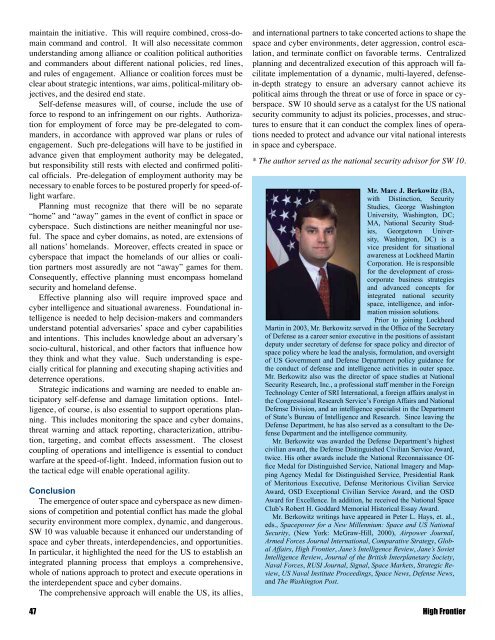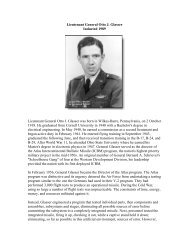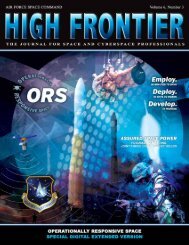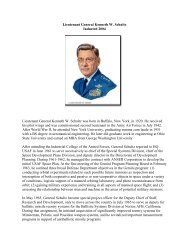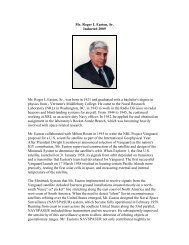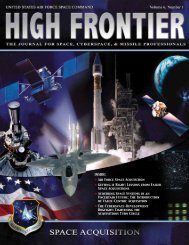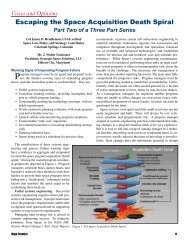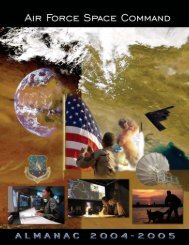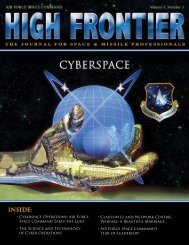Schriever Wargame 2010 - Air Force Space Command
Schriever Wargame 2010 - Air Force Space Command
Schriever Wargame 2010 - Air Force Space Command
- No tags were found...
You also want an ePaper? Increase the reach of your titles
YUMPU automatically turns print PDFs into web optimized ePapers that Google loves.
maintain the initiative. This will require combined, cross-domain<br />
command and control. It will also necessitate common<br />
understanding among alliance or coalition political authorities<br />
and commanders about different national policies, red lines,<br />
and rules of engagement. Alliance or coalition forces must be<br />
clear about strategic intentions, war aims, political-military objectives,<br />
and the desired end state.<br />
Self-defense measures will, of course, include the use of<br />
force to respond to an infringement on our rights. Authorization<br />
for employment of force may be pre-delegated to commanders,<br />
in accordance with approved war plans or rules of<br />
engagement. Such pre-delegations will have to be justified in<br />
advance given that employment authority may be delegated,<br />
but responsibility still rests with elected and confirmed political<br />
officials. Pre-delegation of employment authority may be<br />
necessary to enable forces to be postured properly for speed-oflight<br />
warfare.<br />
Planning must recognize that there will be no separate<br />
“home” and “away” games in the event of conflict in space or<br />
cyberspace. Such distinctions are neither meaningful nor useful.<br />
The space and cyber domains, as noted, are extensions of<br />
all nations’ homelands. Moreover, effects created in space or<br />
cyberspace that impact the homelands of our allies or coalition<br />
partners most assuredly are not “away” games for them.<br />
Consequently, effective planning must encompass homeland<br />
security and homeland defense.<br />
Effective planning also will require improved space and<br />
cyber intelligence and situational awareness. Foundational intelligence<br />
is needed to help decision-makers and commanders<br />
understand potential adversaries’ space and cyber capabilities<br />
and intentions. This includes knowledge about an adversary’s<br />
socio-cultural, historical, and other factors that influence how<br />
they think and what they value. Such understanding is especially<br />
critical for planning and executing shaping activities and<br />
deterrence operations.<br />
Strategic indications and warning are needed to enable anticipatory<br />
self-defense and damage limitation options. Intelligence,<br />
of course, is also essential to support operations planning.<br />
This includes monitoring the space and cyber domains,<br />
threat warning and attack reporting, characterization, attribution,<br />
targeting, and combat effects assessment. The closest<br />
coupling of operations and intelligence is essential to conduct<br />
warfare at the speed-of-light. Indeed, information fusion out to<br />
the tactical edge will enable operational agility.<br />
Conclusion<br />
The emergence of outer space and cyberspace as new dimensions<br />
of competition and potential conflict has made the global<br />
security environment more complex, dynamic, and dangerous.<br />
SW 10 was valuable because it enhanced our understanding of<br />
space and cyber threats, interdependencies, and opportunities.<br />
In particular, it highlighted the need for the US to establish an<br />
integrated planning process that employs a comprehensive,<br />
whole of nations approach to protect and execute operations in<br />
the interdependent space and cyber domains.<br />
The comprehensive approach will enable the US, its allies,<br />
and international partners to take concerted actions to shape the<br />
space and cyber environments, deter aggression, control escalation,<br />
and terminate conflict on favorable terms. Centralized<br />
planning and decentralized execution of this approach will facilitate<br />
implementation of a dynamic, multi-layered, defensein-depth<br />
strategy to ensure an adversary cannot achieve its<br />
political aims through the threat or use of force in space or cyberspace.<br />
SW 10 should serve as a catalyst for the US national<br />
security community to adjust its policies, processes, and structures<br />
to ensure that it can conduct the complex lines of operations<br />
needed to protect and advance our vital national interests<br />
in space and cyberspace.<br />
* The author served as the national security advisor for SW 10.<br />
Mr. Marc J. Berkowitz (BA,<br />
with Distinction, Security<br />
Studies, George Washington<br />
University, Washington, DC;<br />
MA, National Security Studies,<br />
Georgetown University,<br />
Washington, DC) is a<br />
vice president for situational<br />
awareness at Lockheed Martin<br />
Corporation. He is responsible<br />
for the development of crosscorporate<br />
business strategies<br />
and advanced concepts for<br />
integrated national security<br />
space, intelligence, and information<br />
mission solutions.<br />
Prior to joining Lockheed<br />
Martin in 2003, Mr. Berkowitz served in the Office of the Secretary<br />
of Defense as a career senior executive in the positions of assistant<br />
deputy under secretary of defense for space policy and director of<br />
space policy where he lead the analysis, formulation, and oversight<br />
of US Government and Defense Department policy guidance for<br />
the conduct of defense and intelligence activities in outer space.<br />
Mr. Berkowitz also was the director of space studies at National<br />
Security Research, Inc., a professional staff member in the Foreign<br />
Technology Center of SRI International, a foreign affairs analyst in<br />
the Congressional Research Service’s Foreign Affairs and National<br />
Defense Division, and an intelligence specialist in the Department<br />
of State’s Bureau of Intelligence and Research. Since leaving the<br />
Defense Department, he has also served as a consultant to the Defense<br />
Department and the intelligence community.<br />
Mr. Berkowitz was awarded the Defense Department’s highest<br />
civilian award, the Defense Distinguished Civilian Service Award,<br />
twice. His other awards include the National Reconnaissance Office<br />
Medal for Distinguished Service, National Imagery and Mapping<br />
Agency Medal for Distinguished Service, Presidential Rank<br />
of Meritorious Executive, Defense Meritorious Civilian Service<br />
Award, OSD Exceptional Civilian Service Award, and the OSD<br />
Award for Excellence. In addition, he received the National <strong>Space</strong><br />
Club’s Robert H. Goddard Memorial Historical Essay Award.<br />
Mr. Berkowitz writings have appeared in Peter L. Hays, et. al.,<br />
eds., <strong>Space</strong>power for a New Millennium: <strong>Space</strong> and US National<br />
Security, (New York: McGraw-Hill, 2000), <strong>Air</strong>power Journal,<br />
Armed <strong>Force</strong>s Journal International, Comparative Strategy, Global<br />
Affairs, High Frontier, Jane’s Intelligence Review, Jane’s Soviet<br />
Intelligence Review, Journal of the British Interplanetary Society,<br />
Naval <strong>Force</strong>s, RUSI Journal, Signal, <strong>Space</strong> Markets, Strategic Review,<br />
US Naval Institute Proceedings, <strong>Space</strong> News, Defense News,<br />
and The Washington Post.<br />
47 High Frontier


